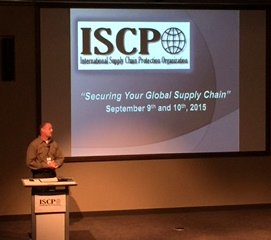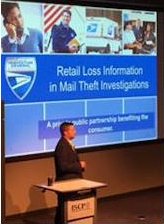Sunday, 13 September 2015
Katherine Houston, LPQ
Associations in Action
This past week the second annual International Supply Chain Protection Organization (ISCPO) Conference was held at the Fossil Headquarters in Richardson Texas. Hosting 125 attendees and 12 vendors exhibits, the organization’s second conference has almost doubled in size when compared to the inaugural conference in 2014. The event carried much enthusiasm and boasted strong presentations and participation from those in attendance.
The event kicked off in great fashion with a keynote presentation by Mark Stinde with 7-Eleven reflecting on supply chain opportunities as part of building a successful program. Stinde stressed the importance of developing strategies to fit your specific situation. While Convenience Store retailing may operate somewhat differently than more traditional retail settings, the importance of the supply chain and the pressing need to ensure that the stores are adequately stocked at all times is remains a common goal. It’s critical to anticipate and prepare for industry changes and adjust business plans accordingly. Multi-channel options like ordering online and endless aisles continue to grow and create opportunities for the business, and it’s critical to plan ahead. When it comes to protecting your people and product, solutions are not plug and play. What works for one situation or company will not necessarily work for another. Be sure you know your specific situation and investigate the options to ensure you can resolve any situation and keep your business on track.
A last-minute change in the agenda featured a well-prepared session from Rod Fulenwider on active shooter incidents. The session worked through several case studies of recent events, echoing many of the key points that have been stressed in other presentations this year while sharing critical messages that we all should embrace: Be aware of your surroundings, assess behavior and put it into context, have a plan in preparation of a potential incident, and be sure to train and test your team on the plan.
Wes Banks, LPC then discussed risks and controls when using regional/third-party logistics (or 3PL) carriers. He emphasized that you often get what you pay for, and many of these companies are focused on moving freight—not securing freight. Banks stressed the importance of assessing each hub of the supply chain and conduct routine audits to help ensure that security is a priority. By the same respect, it is important to ensure that the audit process won’t be cost-prohibitive and to work with the carrier to reduce daily loss. One solution is to develop partnerships with other companies that use those carriers and share carrier expectations and audit results. Wes introduced the ISCPO Carrier Security Audit as a means to provide a framework and enable this collaboration.
The afternoon sessions began with David Jones from DHL reviewing recent cargo theft data and trends. After identifying key areas, the majority of the session focused on Latin America as one of the most prevalent areas of concern. These countries have shown to be susceptible to increased cargo theft due to their poor infrastructure and lack of law enforcement personnel with cargo crime specialization. While tactics such as jammers require technology improvements, it is also important to watch your environment for potential opportunities for thieves to infiltrate your organization and help their groups target high value products and shipments.
The final session discussed the importance of business continuity and the supply chain. Covering 15 factories in 9 countries, Jim Evans from Texas Instruments emphasized the importance of approaching business continuity plans based on the impact to the business—not the specific event. Common aspects of business continuity planning focus on response when there is danger to the safety of the employees within a facility and how to react if the facility loses power/utilities. However, it’s just as important not to overlook other impacts, such as having a plan for how the business should react if a supplier or delivery channel is affected which in turn limits the delivery of products. Set business continuity expectations with suppliers to ensure both parties understand the impact and response to ensure your business can react appropriately.
The 2nd day of the ISCPO Conference kicked off with two Special Agents from the U.S. Postal Service OIG addressing Retail Data Loss and its use in Internal Mail Investigations. This was followed by a session with AIG Property Casualty covering Loss Control from an Insurance Perspective & Current Industry Security Standards. The final session gave the attendees and vendors a chance to participate in an Open Forum Roundtable. This was an opportunity to recommend topics for the 2016 ISCPO Conference, ask for recommendations on issues they might be having in the work environment, seek resources and partnerships with other attendees.
The conference wrapped up with a conversation with Glenn Master, ISCPO Chairman, and the Board of Directors thanking the attendees and vendors for their continued support for the organization and how the ISCPO Team might continue to support the community moving forward.LP Magazine ISCPO Article



